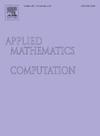Belonging and refueling: Group dynamics in foraging flocks
IF 3.4
2区 数学
Q1 MATHEMATICS, APPLIED
引用次数: 0
Abstract
We extend the Couzin collective motion model with energy–dependent foraging, where agents balance two competing motivations: remaining with the group versus breaking away to refuel. While both behaviors are individually driven, they reflect different priorities–social cohesion versus physiological need. Our results bridge foraging theory with collective motion, revealing how state-dependent behavioral switching produces phase transitions with implications for collective decision-making in natural systems and autonomous swarm design. Local repulsion–orientation–attraction interactions produce group behavior, whereas refueling requires an intentional defection from this emergent cohesion. Our model explores how agents switch between these internally motivated but functionally distinct behaviors and how this switching gives rise to collective phase transitions. Environmental constraints like ground repulsion radius restrict parameter regions supporting coherent motion while preserving energy balance, showing maintained foraging performance despite spatial limitations.归属与补给:觅食群的群体动力学
我们将Couzin的集体运动模型扩展到能量依赖的觅食中,在这个模型中,个体平衡了两种相互竞争的动机:留在群体中还是离开去补充燃料。虽然这两种行为都是个人驱动的,但它们反映了不同的优先级——社会凝聚力与生理需求。我们的研究结果将觅食理论与集体运动联系起来,揭示了状态依赖行为切换如何产生相变,并对自然系统和自治群体设计中的集体决策产生影响。局部排斥-定向-吸引相互作用产生群体行为,而加油需要有意地背离这种涌现的凝聚力。我们的模型探讨了代理人如何在这些内部激励但功能不同的行为之间切换,以及这种切换如何引起集体相变。地面斥力半径等环境约束限制了支持相干运动的参数区域,同时保持了能量平衡,在空间限制下仍能保持觅食性能。
本文章由计算机程序翻译,如有差异,请以英文原文为准。
求助全文
约1分钟内获得全文
求助全文
来源期刊
CiteScore
7.90
自引率
10.00%
发文量
755
审稿时长
36 days
期刊介绍:
Applied Mathematics and Computation addresses work at the interface between applied mathematics, numerical computation, and applications of systems – oriented ideas to the physical, biological, social, and behavioral sciences, and emphasizes papers of a computational nature focusing on new algorithms, their analysis and numerical results.
In addition to presenting research papers, Applied Mathematics and Computation publishes review articles and single–topics issues.

 求助内容:
求助内容: 应助结果提醒方式:
应助结果提醒方式:


